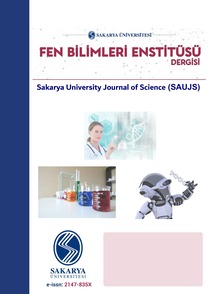The Fractional-Order mathematical modeling of bacterial resistance against multiple antibiotics in case of local bacterial infection
Lokal Bakteriyel enfeksiyon durumunda çoklu antibiyotik tedavisine karşı bakteriyel direncin kesirsel mertebeden matematiksel modellemesi
___
E. I. Mondragón et al., “Mathematical modeling on bacterial resistance to multiple antibiotics caused by spontaneous mutations,” BioSystems, vol. 117, pp. 60–67, 2014.B. Daşbaşı and İ. Öztürk, “Mathematical modelling of bacterial resistance to multiple antibiotics and immune system response,” SpringerPlus, vol. 5, no. 408, pp. 1-17, April 2016.
A. G. Mahmoud and L B Rice, “Antifungal agents: mode of action, mechanisms of resistance, and correlation of these mechanisms with bacterial resistance, and correlation,” Clin. Microbiol. Rev., vol. 12, no. 4, pp. 501–517, 1999.
L. Ternent, R. J. Dyson, A. M. Krachler, and S. Jabbari, “Bacterial fitness shapes the population dynamics of antibiotic resistant and susceptible bacteria in a model,” J. Theor. Biol., vol. 372, pp. 1-11, 2014.
D. P. Arya, Aminoglycoside Antibiotics: From Chemical Biology to Drug Discovery. New Jersey: Wiley, 2007.
M. S. Butler and A D Buss, “Natural products - The future scaffolds for novel antibiotics?,” Biochem. Pharmacol., vol. 71, no. 7, pp. 919- 929, 2006.
A. E. Clatworthy, E. P. Pierson, and D. T. Hung, “Targeting virulence: a new paradigm for antimicrobial therapy,” Nature Chem. Biol., vol. 3, pp. 541-548, 2007.
K. Lewis, “Platforms for antibiotic discovery,” Nat. Rev. Drug Discov., vol. 12, pp. 371-387, 2013.
A. J. McMichael, “La “epidemiología molecular”: nueva ruta de investigación o compañero de viaje?,” Bol. Oficina. Sanit. Panam., vol. 119, no. 3, pp. 243–254, 1995.
Y. Zhang, “Mechanisms of drug resistance in Mycobacterium tuberculosis,” Int. J. Tuberc. Lung Dis., vol. 13, no. 11, pp. 1320–1330, 2009.
Y. Xue, and J. Wang, “Backward bifurcation of an epidemic model with infectious force in infected and immune period and treatment,” vol. 14, 2012.
H. W. Hethcote, “The mathematics of infectious diseases,” SIAM Rev., vol. 42, pp. 599-653, 2000.
B. Singer, “Mathematical Models of infectious diseases: seeking new tools for planning and evaluating control programs,” Supplement to Popul. Dev. Rev., vol. 10, pp. 347–365, 1984.
M. Mohtashemi, and R Levins, “Transient dynamics and early diagnosis in infectious disease,” J. Math. Biol., vol. 43, pp. 446-470, 2001.
R. Gorenflo, and F. Mainardi, Fractional calculus: Integral and differential equations of fractional order, in: A. Carpinteri, F. Mainardi (Eds.), Fractals and Fractional Calculus in Continuum Mechanics.: Springer, Wien, 1997.
A. Whitman, and H. Ashrafiuon, “Asymptotic theory of an infectious disease model,” J. Math. Biol., vol. 53, no. 2, pp. 287-304, 2006.
I. Podlubny, Fractional Differential Equations.: Academic Press, 1999.
E. M. El-Mesiry, A. M. A. El-Sayed, and H. A. A. El-Saka, “Numerical methods for multi-term fractional (arbitrary) orders differential equations,” Appl. Math. Comput., vol. 160, no. 3, pp. 683–699, 2005.
A. M. A. El-Sayed, F. M. Gaafar, and H. H. Hashem, “On the maximal and minimal solutions of arbitrary orders nonlinear functional integral and differential equations,” Math. Sci. Res. J., vol. 8, no. 11, pp. 336–348, 2004.
D. Matignon, “Stability results for fractional differential equations with applications to control processing,” Comput. Eng. Sys. Appl. 2, vol. 963, 1996.
I. Podlubny, and A. M. A. El-Sayed, On Two Definitions of Fractional Calculus.: Slovak Academy of Science, Institute of Experimental Phys., 1996.
E. Ahmed, A.M.A. El-Sayed, and H.A.A. El Saka, “On some Routh–Hurwitz conditions for fractional order differential equations and their applications in Lorenz, Rössler, Chua and Chen systems,” Phys. Lett. A, vol. 358, 2006.
E. Ahmed, A. M. A. El-Sayed, and H. A. A. ElSaka, “Equilibrium points, stability and numerical solutions of fractional-order predatorprey and rabies models,” J. Math. Anal. Appl., vol. 325, pp. 542-553, 2007.
H. A. El-Saka, E. Ahmed, M. I. Shehata, and A. M. A. El-Sayed, “On stability, persistence and Hopf Bifurcation in fractional order dynamical systems,” Nonlinear Dyn., vol. 56, pp. 121-126, 2009.
H. El-Saka, and A. El-Sayed, Fractional Order Equations and Dynamical Systems. Germany: Lambrt Academic Publishing, 2013.
B. Daşbaşı, and İ. Öztürk, “The dynamics between pathogen and host with Holling type 2 response of immune system,” Journal Of Graduate School of Natural and Applied Sciences, vol. 32, no. 1, pp. 1-10, 2016.
K. Diethelm, and N. J. Ford, “Analysis of fractional differential equations,” Journal of Mathematical Analysis and Applications, vol. 265, no. 2, pp. 229-248, 2002.
Health Organization World, “The Evolving Threat of Antimicrobial Resistance,” in Options for Action, 2012, pp. 1503-1518 ISBN: 978 924.
J. Alavez et al., “Within-host population dynamics of antibiotic-resistant M. tuberculosis,” Math. Med. Biol., vol. 24, pp. 35-56, 2006.
P. Coll, “Fármacos con actividad frente a Mycobacterium tuberculosis,” Enfer-medades Infecciosas y Microbiologa Clnica, vol. 27, no. 8, pp. 474–480, 2009.
Y. Zhang, Y. Dhandayuthapani, and S. V. Deretic, “Molecular basis for the exquisite sensitivity of Mycobacterium Tuberculosis to isoniazid,” PNAS, vol. 93, no. 23, pp. 13212- 13216, 1996.
J. Romero, E. Ibargüen, and L. Esteva, “Un modelo matemático sobre bacteriassensibles y resistentes a antibióticos,” Matemáticas: Ense˜nanza Universitaria, vol. 20, no. 1, pp. 55- 73, 2011.
B. Daşbaşı, “Dynamics between Immune System-Bacterial Loads,” Imperial Journal of Interdisciplinary Research (IJIR), vol. 2, no. 8, pp. 526-536, 2016.
- ISSN: 1301-4048
- Yayın Aralığı: 6
- Başlangıç: 1997
- Yayıncı: Sakarya Üniversitesi Fen Bilimleri Enstitüsü
Rotational Hypersurfaces in S ( ) R 3 r Product Space
Nonlineer denklemleri çözmek için yeni öngörme-düzeltme tipi yineli yöntemler
New predictor-corrector type iterative methods for solving nonlinear equations
Olcay ALPAY, Emel ÇANKAYA, Ahmet ÖZER
Some sums related to the terms of generalized Fibonacci autocorrelation sequences ak n,
Öklid uzayında bertrandian darboux regle yüzeyin diferensiyel geometrik elemanlar
